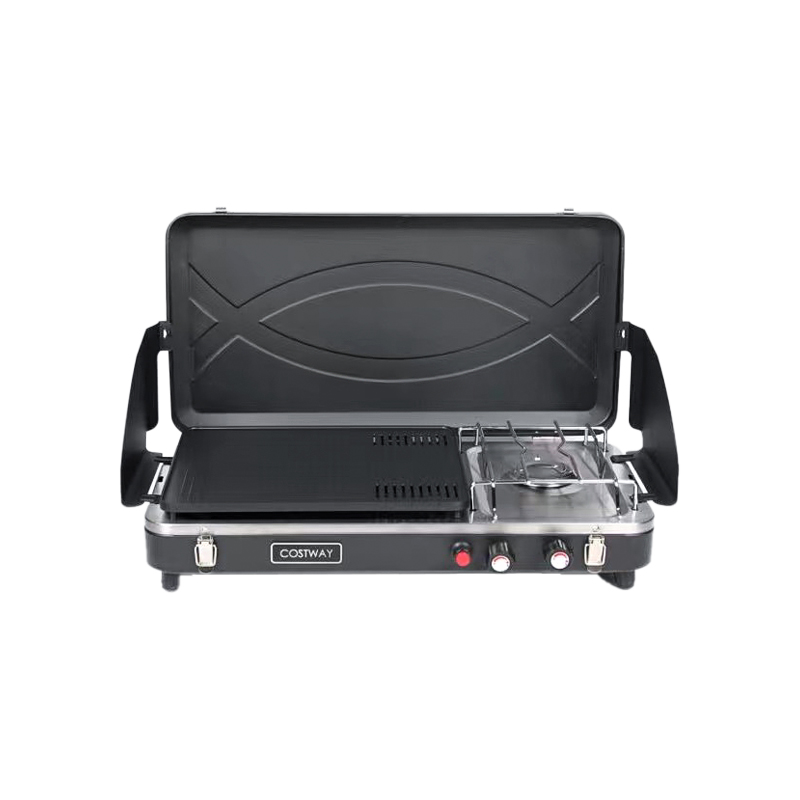Home / News / Industry News / What measures are in place to prevent rust and corrosion on Steel Barbecue Grill, especially in wet or coastal environments?
Preventing rust and corrosion on a steel barbecue grill, particularly in wet or coastal environments where the risk is higher, requires proper care and maintenance. Here are several measures you can take:
1.Choose Stainless Steel: When selecting a grill, look for models constructed with high-quality stainless steel, preferably 304 or 316 stainless steel. These grades contain corrosion-resistant alloys like chromium and nickel, which offer superior protection against rust and corrosion.
2.Regular Cleaning: After each use, thoroughly clean the grill. Use a grill brush or scraper to remove leftover food particles, grease, and any surface contaminants. Pay special attention to the cooking grates, burners, and other exposed steel components.
3.Cover Your Grill: Invest in a well-fitting grill cover designed to protect against the elements. A cover acts as a shield, preventing rain, moisture, and salty coastal air from coming into direct contact with the grill. Always ensure that the grill has cooled down before covering it to prevent condensation.
4.Keep it Dry: If your grill gets wet, whether from rain or cleaning, take the time to dry it thoroughly. Moisture trapped on the surface can accelerate corrosion. Towel-dry or allow the grill to air-dry completely before covering it.
5.Oil the Grates: After cleaning, lightly coat the cooking grates with a thin layer of cooking oil or specialized grill grate oil. This creates a barrier that helps deter rust formation. Seasoning the grates with oil before cooking can also enhance flavor and reduce sticking.
6.Inspect and Replace Parts: Regularly inspect all components of the grill, including burners, heat shields, and fasteners. Look for any signs of rust or corrosion. If you notice any issues, replace affected parts promptly to prevent further corrosion.
7.Use a Rust Inhibitor: Some products are specifically designed to inhibit rust and corrosion on stainless steel surfaces. Follow the manufacturer's guidelines when applying these inhibitors, typically by wiping or spraying them on the affected areas.
8.Keep the Drip Tray Clean: The drip tray beneath the grill can accumulate a combination of grease, food particles, and moisture. Regularly remove and clean it to prevent rust from forming in this often-neglected area.
9.Elevate the Grill: If possible, place your grill on a raised surface like a grill pad or stand. This promotes better airflow and drainage underneath the grill, reducing the risk of moisture buildup and rust formation.
10.Avoid Salt Exposure: Coastal environments can introduce salt air, which is corrosive. If you live near the coast, position your grill in a location protected from direct salt spray. Additionally, periodically rinse your grill with fresh water to remove any salt residue that may have settled on it.
11.Season the Grates: Seasoning stainless steel grates with oil helps create a protective layer that minimizes the risk of rust. To season, preheat the grill, brush the grates with oil, and allow them to cool before cooking.
12.Store Grilling Accessories Properly: When not in use, store grilling tools, accessories, and any removable grill parts in a dry location, such as a garage or shed. This prevents rust from forming on the surfaces of these items.
By following these measures and maintaining a consistent cleaning and maintenance routine, you can significantly extend the lifespan of your steel barbecue grill and reduce the risk of rust and corrosion, even in wet or coastal environments.


Surface Treatment: Powder Coated
Material: Qualified Steel
Use: BBQ /Heating
Heating Principle: By Fuel Gas
Feature: Easily Assembled, Easily Cleaned


 English
English 中文简体
中文简体 Español
Español ++86 13567131698
++86 13567131698










